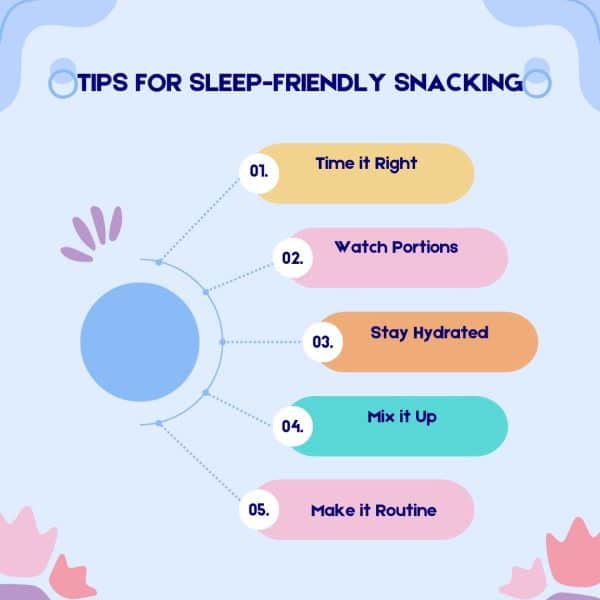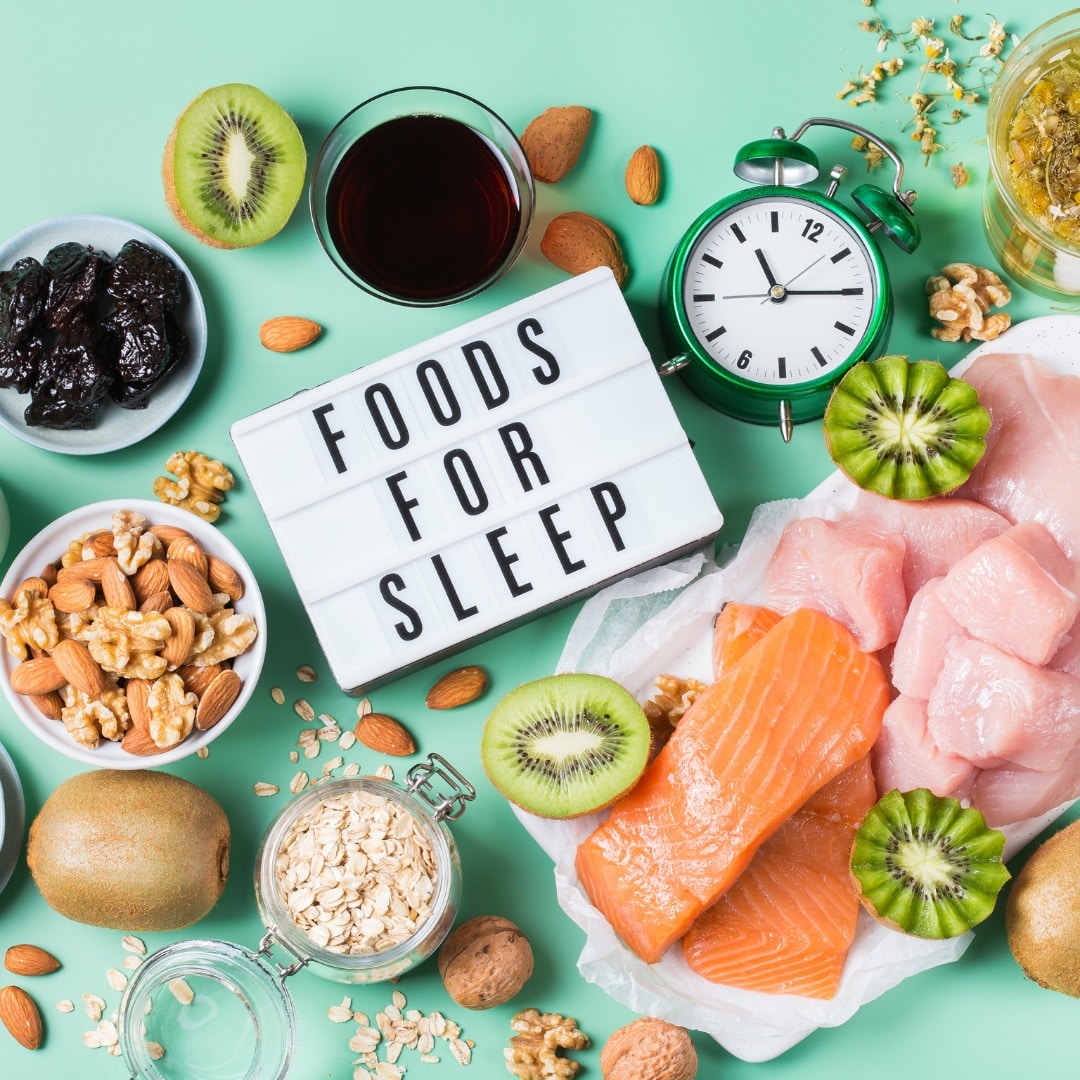We’ve all had nights where we toss and turn in bed, struggling to fall asleep. Getting good sleep is super important for staying healthy and having enough energy during the day. But sometimes it feels impossible to get the sleep we need.
Not getting enough quality sleep is a big deal. It’s crucial for having a strong immune system, managing your moods, appetite, and even weight. Not sleeping well long-term puts you at higher risk for heart disease, diabetes, and other health issues. In the short-term, lack of sleep makes it tough to focus and be productive at school or work.
Even though we know how important sleep is, many of us still struggle to get the recommended 7-9 hours per night. Stress, irregular schedules, sleep disorders, and other factors can all lead to sleep difficulties.
One thing that can really impact how well we sleep is the foods we eat right before bedtime. Making smarter snack choices may be the key to getting better sleep.
You may have heard about some classic “sleep-promoting” foods like warm milk or turkey. But the reality is that all kinds of snacks and nutrients can either help or disrupt your ability to fall asleep and stay asleep through the night. Being intentional about your nighttime snack can make a big difference.
Coming up, we’ll look at the science behind how certain foods and nutrients like tryptophan, magnesium, and melatonin affect our sleep cycles. You’ll learn about the top bedtime snacks for a good night’s sleep like kiwi, tart cherries, popcorn, nuts and more. We’ll also reveal the major snacking mistakes to avoid if you want better sleep quality.
So get comfortable as we break down all the details on using your evening snacking habits to help you sleep better.
How Food Affects Sleep
Sleep is a complex process that gets influenced by many different things, including what we put into our bodies. Some foods contain nutrients that can promote better sleep, while others may have the opposite effect and keep us awake at night. Understanding this connection is the first step in using snacks to improve your sleep.
What Makes a Snack Sleep-Friendly?
So what kind of snacks are best for sleep? Look for foods with:
Tryptophan – This nutrient helps make sleep hormones like melatonin. Foods high in tryptophan include nuts, oats, turkey, and dairy.
Magnesium – This mineral helps relax muscles and regulate melatonin. Good sources are spinach, pumpkin seeds, avocados, and bananas.
Complex carbs – Foods high in fiber like whole grains, beans, and fruits can help stabilize your blood sugar overnight so you don’t wake up.

The Top Bedtime Snacks For A Good Night’s Sleep
Some top snack picks to help you sleep better include:
Air-Popped Popcorn – This whole grain has fiber to keep you full and tryptophan to make you sleepy. Fiber is filling and may also help keep your blood sugar stable at night which is good as low blood sugar can make you hungry. Just have the plain air-popped kind, not movie theater style.
Kiwi – These little fruits have vitamins and antioxidants that boost serotonin to help you sleep. Kiwis are one of the best fruit sources of serotonin. In one study, people that ate 2 kiwis one hour before going to bed fell asleep faster, slept longer, and had overall better quality sleep.
Tart Cherries – Tart cherry juice is a natural source of the sleep hormone melatonin. They’re also high in sleep promoting antioxidants. A study in which people drank two 1-cup servings of tart cherry juice every day found these folks slept longer and more soundly. Have some juice or fresh cherries about an hour before bed.
Nuts and Nut Butters – All kinds of nuts and nut butters contain protein, healthy fats, and tryptophan to help you sleep well. Nuts also contain minerals like magnesium and zinc that promote healthy sleep. Studies have shown that a combo of magnesium, zinc, and melatonin may help promote better sleep in seniors with insomnia. So grab a handful of walnuts, pistachios, or cashews for your bedtime snack. Almond butter on whole grain bread is a good option too.
Red Grapes – Grapes contain melatonin and serotonin, plus antioxidants that may improve sleep quality. They can also satisfy sweet cravings before bed. However, bear in mind the climate and soil the grapes are grown in may have an impact on their melatonin content.
The Snacks That Disrupt Sleep
On the other hand, some snacks can actively prevent you from getting good sleep, like:
Alcohol – While alcohol may help you fall asleep faster, it leads to poorer quality sleep with more tossing and turning.
Caffeine – Caffeine from coffee, tea, soda, and chocolate too close to bedtime can keep you awake since it’s a stimulant.
Spicy or Fried Foods – These harder to digest snacks can cause indigestion, heartburn, and stomach issues that disrupt sleep.
Sugary Treats – Snacks loaded with added sugars can spike then crash your blood sugar, making it hard to sleep through the night. Also, these foods are loaded with extra calories that may lead to unwanted weight gain.
The overall goal with these snacking tips is to promote a calm digestive state and provide your body with the right nutritional assistance to effectively cycle through all the stages of quality sleep. It takes a bit of conscious effort, but prioritizing smart snacking can make a big difference in how rested you feel.

Tips for Sleep-Friendly Snacking
In addition to choosing the right foods, use these tips for snacking to optimize sleep:
Time it Right – Have your snack 1-2 hours before your normal bedtime to allow time to digest. Eating a large meal too close to bedtime can lead to digestive discomfort that makes it harder to fall asleep and stay asleep. By having your snack 1-2 hours before your normal bedtime routine, you allow your body enough time to start digesting the food. That way, you aren’t dealing with a heavy, full stomach when you lay down to sleep. The snack will give you a gentle sense of fullness and satiety so hunger pangs don’t keep you awake.
Watch Portions – Don’t overdo it on snack portions that could make you feel overly full and uncomfortable in bed. It’s easy to eat too much when snacking mindlessly in front of the TV or scrolling on your phone. But eating too much of any food too close to bedtime, even healthy snacks, can overwhelm your digestion. Stick to reasonable portion sizes like 1 cup of air-popped popcorn, 1 kiwi fruit, 1⁄4 cup of tart cherries, or a small handful of nuts. This way you get the sleep-promoting benefits without overdoing it.
Stay Hydrated – Drink water with your snack since being well-hydrated helps with quality sleep. Proper hydration is important for quality sleep. Having some water, herbal tea, or another non-caffeinated beverage with your snack helps top up your fluid levels. Just be sure not to overdo it on liquids right before bed to avoid excessive bathroom trips that can disrupt sleep. Slowly sip 8-12 oz with your snack.
Mix it Up – Combine sleep-promoting foods like tart cherry juice and walnuts to get different helpful nutrients. For example, spread some tart cherry jam over a rice cake topped with a sprinkle of walnuts and a few red grapes on the side. The different foods provide various sleep-enhancing nutrients like tryptophan, serotonin, melatonin, and magnesium.
Make it Routine – Build your sleep-friendly snacking into your regular pre-bed routine so your body knows it’s time to rest. Our bodies run on circadian rhythms that get reinforced by routines. By consistently having your sleep-friendly snack at roughly the same time each night as part of your pre-bed ritual, you reinforce your body’s sleep-wake cycle. It will start to recognize that snack as a cue that it’s time to wind down and get sleepy. Sticking to the same general sleep/wake schedule helps too.
Conclusion
So there you have it – the top snacks and tips for promoting better sleep through your evening munching routine! Getting quality sleep is one of the most important things you can do for your overall health and well-being. And making some simple swaps and adjustments to your nighttime snacking habits can make a big difference.
Instead of reaching for sugary treats, caffeine, greasy foods, or alcohol before bed, go for smart options like air-popped popcorn, kiwi fruit, tart cherry juice, nuts and nut butters, or red grapes. These sleep-friendly foods provide nutrients like tryptophan, magnesium, melatonin, and serotonin that help lull your body into restorative slumber.
But it’s not just about what you eat, it’s also about when and how you eat it. Having your snack about 1-2 hours before lights out gives your body time to start digesting. Watching your portions prevents that overly full feeling that can keep you tossing and turning. And washing it down with some hydrating water or herbal tea gets you prepped for high-quality zzz’s.
Making your pre-bed snack routine a consistent habit is key too. It creates a signal for your brain and body that it’s officially time to start winding down from the day. Pairing your sleep-promoting snack with other calming bedtime rituals like light stretching, reading, or meditating makes it even more powerful.
At the end of the day (or night!), prioritizing smart snacking is just one piece of the puzzle for great sleep. But it’s an important one that is totally within your control. So next time you hear your tummy rumbling near bedtime, skip the disruptive treats and go for something that will actually work in your favor instead of against you. Your well-rested self will thank you!
***Disclaimer: This post is for informational purposes only and should not be construed as medical advice***


